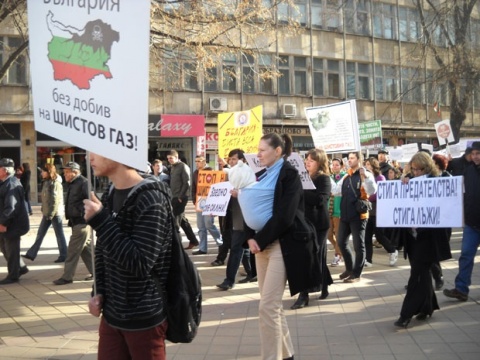
Bulgarian Government Withdraws Chevron’s Shale Gas Permit
Publication: Eurasia Daily Monitor Volume: 9 Issue: 16
By:

The Bulgarian Parliament has indefinitely suspended shale gas exploration and extraction in the country under public pressure from environmentalist groups. The moratorium will affect shale gas and oil exploration on the entire territory of Bulgaria and along its Black Sea shore (Bulgarian National Television, January 20). Bulgaria has become the second European country after France to ban the extraction technology of hydraulic fracturing, the only method used in the world for releasing shale gas deposits.
The parliament voted overwhelmingly with 166 votes for the moratorium and only 6 against. Opponents of the moratorium were led by former Prime Minister Ivan Kostov, leader of the Democrats for a Strong Bulgaria. Kostov stated during the parliamentary debate that the diversification of gas supplies is a question of national security, stressing that the only energy crisis Bulgaria has ever faced was when Russia cut gas supplies to Ukraine in 2009 (novinite.bg, January 18). Bulgaria depends on Russia for over 90 percent of its gas supplies. Potential shale gas deposits could alter Gazprom’s monopoly over the Bulgarian gas market and bring down energy prices. Currently, Bulgaria buys gas from Gazprom at $420 per 1,000 cubic meters, a price that is four times higher than in gas-producing countries.
The parliamentary decision came seven months after the American energy giant Chevron won a tender and received a permit for exploration of shale gas in northeast Bulgaria. According to the Ministry of Economy and Energy, Bulgaria may hold 300 billion to 1 trillion cubic meters of shale gas supplies that can last for 100 to 250 years. Despite this promising prospect for energy independence, the Bulgarian Prime Minister Boyko Borissov made a U-turn in his energy policy that had initially aimed to reduce dependence on Russian energy supplies. The government withdrew Chevron’s Bulgarian exploration permit on January 18, after environmental groups staged a coordinated protest in Sofia and 12 other cities to oppose hydraulic fracturing or “fracking” (24, January 18.)
Local environmental groups believe that the technology that uses water, sand and chemicals to make openings in the fossil rocks and release shale gas may cause water and soil pollution in the most fertile Dobrudzha region of Bulgaria. But geology professor Kristalina Stoykova says that the technology has been used in the same region for many years. In fact, 200 drills for conventional gas and oil pass through the underground water supplies of the Dobrudzha plane (Dnevnik, January 20.) In addition, shale gas explorations in the Romanian part of Dobrudzha region will be drilled through underground water supplies that the two countries share.
The parliament, however, made a political decision without an expert assessment by any scientific institution in the country. The attack against Chevron and shale gas exploration was led by three parliamentarians from the Socialist Party, two of whom have signed agreements with Gazprom in their former capacity as government ministers, and one has been close to the consultant of the Belene nuclear plant, one of the three major Russian energy projects in Bulgaria (Capital Weekly, January 20). The Socialist MPs’ proposal for legislation to permanently ban shale gas in Bulgaria has led analysts to conclude that the environmental protests were fueled by vested interests in the energy sector related to Russian energy companies. Alex Alexiev, Chairman of the Center for Balkan and Black Sea Studies in Sofia, said that the bills coincide with the opinion on shale gas exploration published by Gazprom’s board of directors in November 2011 (FOCUS News Agency, December 15, 2011.)
Small environmental protests have erupted periodically in the northern part of Bulgaria since the news about Chevron’s pending contract became public. The protests were visibly energized by the campaign of the Socialist candidate for President, Ivaylo Kalfin, who promised a moratorium on shale gas exploration if he won the presidency in October 2011. Since the candidate of the ruling party Rosen Plevneliev defeated Kalfin, the protests were expected to subside, but they instead increased within days before the official inauguration of the new President. The well-coordinated protests seemingly did not benefit from wide public support: a public opinion survey conducted in the same week showed that 75 percent of Bulgarians support shale gas explorations where there are ensured guarantees for environmental protection (publics.bg, January 17).
In a TV interview, the Economy and Energy Minister Traicho Traikov said that powerful financial interests were behind the protests against shale gas exploration, which have been organized through a large-scale PR campaign (bTV, January 23). He said that the cabinet has not given up on the services of the US company Chevron, but took public opinion into account.
As opponents of shale gas exploration in Bulgaria moved their protest to the Romanian Embassy in Sofia (Bulgarian National Television, January 24), Poland’s government declared that the ban on shale gas in Bulgaria has in no way affected its resolution to pursue energy independence through shale gas production (www.novinite.bg, January 19). Chevron has started operations in both countries.
Three days after the Bulgarian parliament banned shale gas exploration, Gazprom announced that it will speed up building the South Stream gas pipeline and intends to begin work at the end of 2012 instead of next year (publics.bg, January 21).




